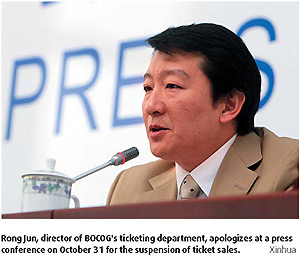The collapse of the Olympic online ticketing system on October 30 may have embarrassed organizers but box office managers have moved fast to control the damage to their image and recover lost sales.

On the day after the second round of ticket sales was suspended due to unmanageable domestic demand, BOCOG issued an apology to the public. The top ticketing officer apologized again the next day at a press conference for having "underestimated the situation and enthusiasm of people" and not having an effective contingency plan.
After much internal deliberation, BOCOG has decided to go back to the random-draw system used in the first round, following what it describes as a "people-oriented policy" and "principles of fairness, impartiality, and convenience to the public."
Although I was frustrated by the system's failure after wasting hours logging on to the website and calling the hotline, I am willing to forgive and forget, and oblige BOCOG by adhering to its call for patience.
It appeased my discontent when I thought the red-faced Olympic organizers had apologized profusely for the mistakes that led to the crash. The management seems to have been communicating honestly and openly, providing complete information to the media. And now it has come up with a practical solution.
I hope BOCOG's handling of this emergency will mark a departure from its previous approach, where it tended to batten down the hatches, avoid apologizing and deter any line of questioning.
Such was the case in July, when a blaze broke out at Peking University Gymnasium, the table tennis venue for the 2008 Olympic Games, and again when the Olympic mascots were renamed "Fuwa" from their original title of "Friendlies."
The fire tore through 1,000 sq m of the Olympic building and destroyed part of its roof. It took more than 100 firemen and 17 fire trucks to bring the fire under control. There was no immediate official comment on its cause.
The change of the English name of the Olympic mascots took place quietly some time last year in spite of much brand building. The general public only knew that the old name had been dropped courtesy of a local tabloid in the city. There was never any official explanation on the rationale behind the name change.
In comparison, there has been much more publicity concerning the fast progress of the preparations and state of readiness of the Olympic facilities. Organizers say that their project managers have documented emergency responses to as many as 300 to 400 possible crises at each venue, ranging from a fire alarm, to a spectator suffering from heatstroke, to an athlete who has forgotten to bring their competition equipment.
"We Are Ready!" was actually the theme song of the one-year Olympic countdown in August.
People's expectations of the ticketing system were further heightened before the launch of the second round of sales, when officials promised that the system had gone through "pressure tests" to ensure a free flow of traffic that was expected to surge in the first few days. The booking time for each ticket was also limited to 10 minutes.
Unfortunately, the system was quickly overwhelmed by potential buyers and the managers proved they were not quite ready to meet the demand.
The fiasco may serve as a rude awakening to other organizers, raising alarm bells over the potential risks less than 300 days before the opening of the Games.
Meanwhile, the Olympic public relations team may learn a lesson from this incident, so that next time when a crisis hits they can handle it with the same level of transparency and openness to minimize the impact.